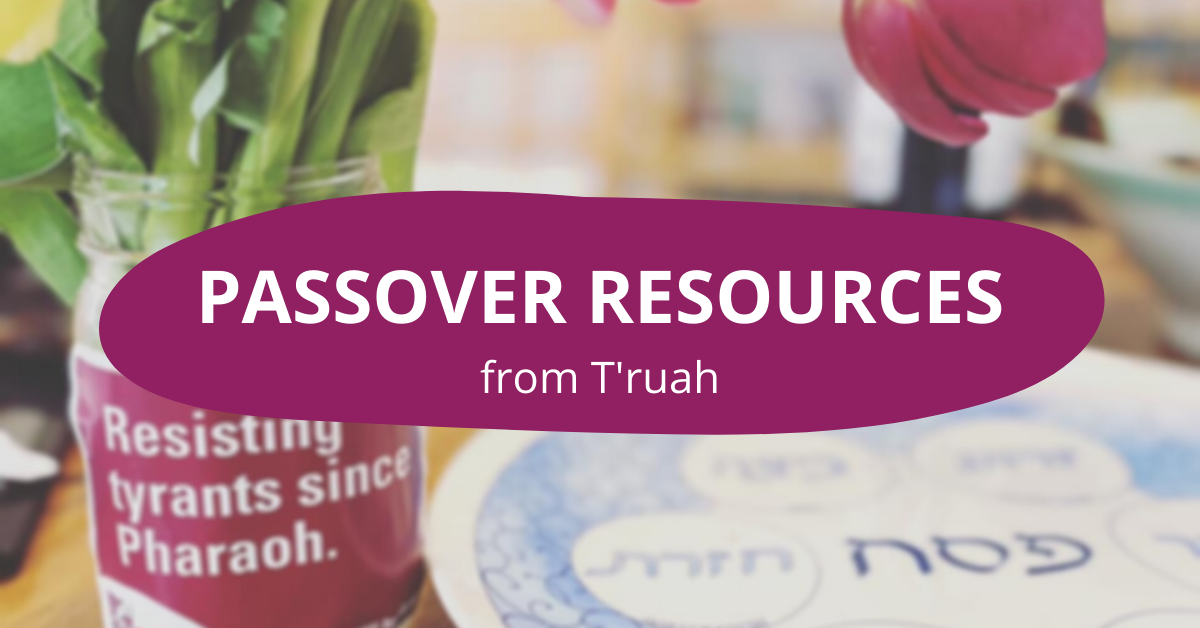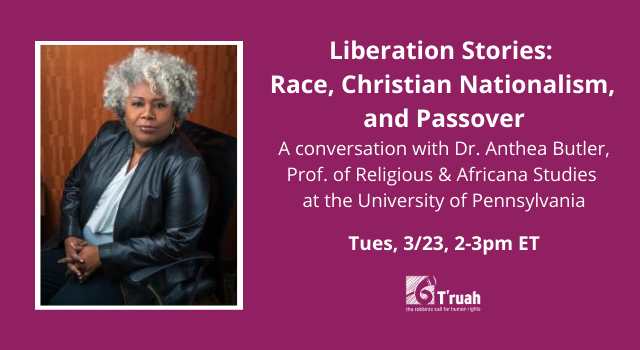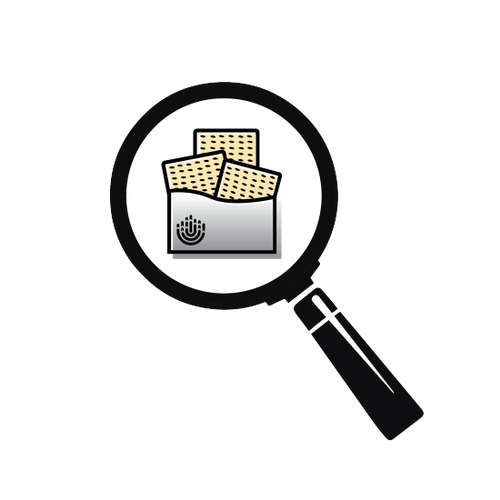Download our human rights haggadah
T’ruah’s updated haggadah helps transform the seder into a conversation about immigration, racism, workers’ rights, and forced labor. Filled with insightful comments and thought-provoking questions, reflections from activists in the field, and full-color artwork done by detained immigrant children and forced labor survivors, the haggadah can serve as the full text of a social justice seder, a section-by-section companion for the traditional haggadah, or a source for the occasional insertion.
Events
This event has passed but a recording can be watched here.
The January 6 Capitol attack has made us all wonder about the ways race and religious extremism intersect in America. As we prepare for Passover, the question of liberation–what it means, who it is for how it is achieved–is also on our minds. In a conversation with Rabbi Sarit Horwitz, Dr. Anthea Butler discusses her new book, White Evangelical Racism: The Politics of Morality in America, and sheds light on questions about race and Christian nationalism in the United States today. Dr. Butler is Associate Professor of Religious Studies and Africana Studies at the University of Pennsylvania.
For the Seder
COVID-19 Supplement
The supplement offers a discussion activity for the Four Children and a reading to deepen the significance of opening the door for Elijah.
How to Lead Your Own Justice Seder with Rabbi Ellen Lippmann
Rabbi Ellen Lippmann, Rabbi Lev Meirowitz-Nelson, and Ronit Schlam offer simple tips to make your distanced seder meaningful instead of daunting. The webinar (recorded 4/1/20) can be a useful resource whether you are the people at your seder will be tweens or older — leading a seder for young children is its own, separate challenge — and if you are navigating challenges around doing a seder with folks not physically in the room with you.
Tomato on the Seder Plate Ritual
This ritual, developed by T’ruah and the Coalition of Immokalee Workers, places a tomato on the seder plate in recognition of the farm workers who picked the tomato and their struggles for justice.
Midwifing Resistance
This short, text-and-photos conversation starter about Jewish women’s resistance over the centuries. Bring it to your seder for use with the Four Children, the story of the Israelites’ enslavement, or a springboard for discussing the #MeToo movement.
Crying Out Against Mass Incarceration: A Haggadah Supplement
This five-page supplement, created by the Jewish Working Group to End Mass Incarceration, offers readings, rituals, and songs.
Refugee Supplement for the Seder
Readings and ritual to bring the voices of African asylum seekers to your seder table.
Visit Haggadot.com for more resources!
Last year, we scrambled. This year, we have time. No matter how you’re gathering this Passover, make the most of your family’s seder with Haggadot.com. Download one of their premade haggadahs, or mix and match to create your customized seder. Join the community of over half a million people making beautiful and meaningful seders with Haggadot.com.
A few favorites from Haggadot.com for 2021. Mix and match with our human rights haggadah, The Other Side of the River, The Other Side of the Sea, to create a meaningful seder:
- Minimalist Haggadah: https://www.haggadot.com/haggadah/minimalist-haggadah
- Comedy Seder: https://www.haggadot.com/haggadah/comedy-seder
- 10-Minute Dayenu Seder: https://www.haggadot.com/haggadah/10-minute-dayenu-seder
Commentary About Passover and the Passover Texts
The Modern Plagues of Climate Change
“I read the plagues of the Exodus story not as supernatural punishments only, but as examples of the natural consequences that plague a society built on oppression and shortsightedness.”
Who Are You in the Passover Story?
“The story of the Exodus is in us, and we are in that story. But where exactly? Every year the seder asks us to imagine our answers.”
Atzma’ut and Atzamot: The Bones of Israel
“Reading haftarah on Shabbat Chol HaMoed Pesach, we saw through the prophet Ezekiel’s eyes a valley full of dry bones…To truly celebrate Yom HaAtzma’ut requires the humility to recognize being an etzem, being an entity fundamentally earth-bound and mortal, linked to others, and waiting for Divine breath to bring life at every moment.”
Opening the Door at Passover
“The Seder recalls our own homelessness as wandering refugees from slavery in Egypt, and even further back, to our ancestor who was called ‘a wandering Aramean’ (Deuteronomy 26:5) … This Passover, we can be moved to do better for today’s refugees.”




